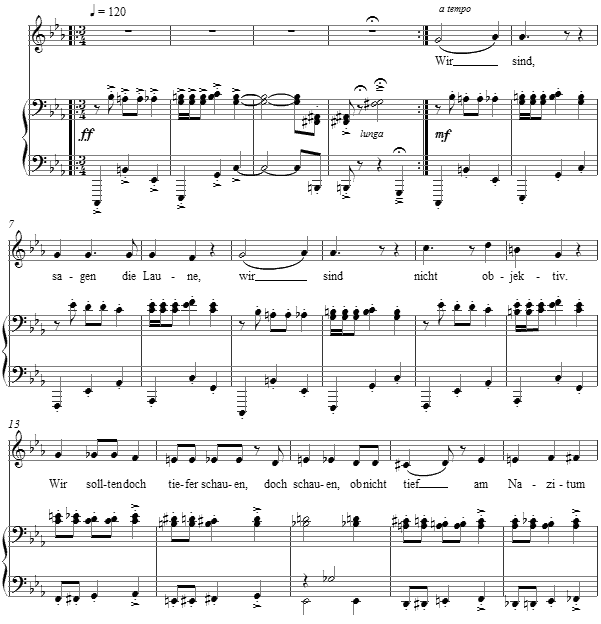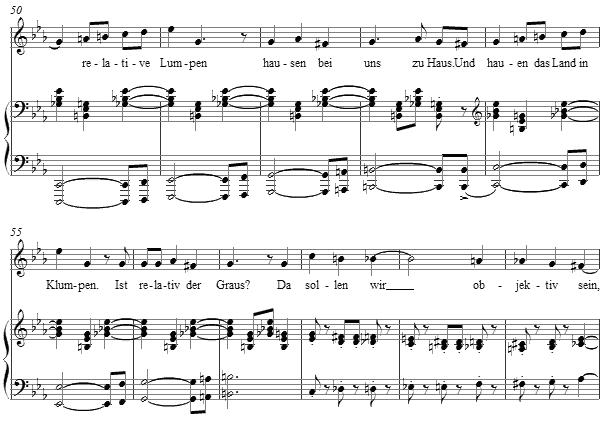Music and Texts of GARY BACHLUND
Vocal Music | Piano | Organ | Chamber Music | Orchestral | Articles and Commentary | Poems and Stories | Miscellany | FAQs
Wir sind... - (2010)
Joachim Ringelnatz
for medium voice and piano
Wir sind, sagen die Lauen,
Wir sind nicht objektiv.
Wir sollten doch tiefer schauen,
Doch schauen, ob nicht tief
Am Nazitum was dran sei,
Ob Hitler nicht doch ein Mann sei.
Wir haben alles erwogen,
Wir wußten alles zuvor,
Mal hat man uns nicht betrogen,
Man machte uns nicht vor,
Daß rechts links und gerade schief sei
Und daß alles relativ sei.
Unrelative Lumpen hausen bei uns zu Haus,
Und hauen das Land in Klumpen.
Ist relativ der Graus?
Da sollen wir objektiv sein,
Wir sollen so naiv sein!
Wir kennen die einfache Wahrheit,
Wir sehen durch ein scharfes Glas.
Und unsere Lehre ist Klarheit.
Und unsere Lehre ist Haß.
Der Haß, der groß und weitsichtig ist,
Der schaffende Haß der wichtig ist.[ 4 pages, circa 2' 35" ]
Joachim Ringelnatz
We are, say the howls of protest,
We are not objective.
We should look even deeper,
Even deeper, though not deep,
At what is the Nazi regime,
Even whether Hitler is not a man.
We have considered it all,
We knew it all before,
Because we weren't fooled by it,
They didn't fool us,
That right, left and straight are distorted [ 1 ]
And all is relative.
Un-relative rabble vandalize our lives,
And smash things about the land.
Is such horror relative?
That we shall be objective,
Is because we are so naive!
We understand the simple truth,
We see through the broken glass.
And our lesson is clarity.
And our lesson is hate.
That hate, that is so huge and foresighted,
That created hatred that is so important. [ 2 ]
Written in or about 1933 and without title from the poet is this poem against the Nazis -- Germany's National Socialist German Workers’ Party -- which held sway from 1933 to 1945. The Nazi Party presented its program in the 25 point National Socialist Program in 1920 thirteen year earlier. The Nazis were anti-parliamentarian, Pan-Germanic for those approved as authentically German, racist, collectivist, advocates of eugenics and opposed to any economic liberalism and political liberalism. The history of this period is still very young, and political commentators since the defeat of Nazideutschland at the end of World War Two have painted the Nazis as "right-wing," in order to somehow set them off against other forms of totalitarianism, which have been termed "left-wing." I find the distinction without a difference, both so-called "wings" being based in collectivism -- socialism in its worst and most murderous forms.
Among the crimes of this Nazi regime was their hunger to define and use art for political purposes. For this many artists were declared "degenerate." (Entartete Kunst) Among them was Ringelnatz, poet, painter and cabaret artist who moreover had served in the German military in World War One. Like Stalin's Soviet Socialist Realism and Mao's Cultural Revolution, the individuality of art and artists was seen as a threat. Indeed it was, for artists commented on the abuse of power by state authority of all kinds, as it has over centuries.
The triple meter and secco texture are intended as a dark recollection of a cabaret style, turned brutal. The repeated emphasis on and elongation of the pronoun "we" establishes the singer as a member of this class, as art itself was under attack within the political coercion and enforced correctness of the socialist state.
The song form is a simple AABA, with the bridge material being a rising bass line under a harmonically static yet dissonant upper gesture.
The score for Wir sind... is available as a free PDF download, though any major commercial performance or recording of the work is prohibited without prior arrangement with the composer. Click on the graphic below for this piano-vocal score.
NOTES
[ 1 ] Forty and more years ago, my teachers in the Los Angeles public school system taught the notion of the right-left model of politics in civics classes. The Nazis were named right-wing, though "National Socialism" as the explanation for the abbreviated term was never mentioned. Equally the Communists were named left-wing, though the USSR was also an abbreviation, whose full meaning of "Union of Soviet Socialist Republics" was equally not mentioned. Nazi versus Communist, in which the Communists were somehow more modern for having survived the war fighting in an alliance with the official Allies of the West, while the Nazis and specifically the Holocaust were somehow proof positive that true evil resided in the right wing, while understandable evils while working towards the goal of a socially equal society resided in the left wing.
History has proven this model utterly false, for the deaths of men, women and children under all forms of socialism was immense, with the Soviet-Socialist and Sino-Soviet forms being the greatest perpetrators of it. I refused the model in that time, and when I read in a contemporary news story about the right and the left, I also refuse that report but rather read between the lines to more deeply understand the world's evils. Ringelnatz states this clearly in his verse, in which "right, left and straight are distorted." That the terms were distorted then and remain distorted is a tribute to the advocates of state power continually using the terms as if opposites. They are not.
One also notes that Ringelnatz, who had to flee the Nazis unlike Erich Mühsam who was captured and torturously murdered, was among the artists who art was declared degenerate. The logic behind this is evident to those who would see it. When an art form tells a truth and that truth strips the pretence from the violent thug in the guise of a political "servant," the servant rises quickly to suppress this. In the modern arena one terms such things "spin," but it comes to the same thing, interpreting en event to the political advantage of one side and against another. Thus the political officers attached to Nazi military units were meant to enforce thought, just as political correctness in the modern day is meant to do. One word is deemed an offence, and the forces of politics to the point of thuggery and more are enlisted to suppress words, as speech. This German comic whose work rested on much nonsense was deemed too dangerous by the National Socialists. Had Ringelnatz not died of tuberculosis in a clinic, I imagine he would have ended his days by the cruelty of the Nazi government.
Moreover Ringelnatz notes in 1933 the argument that all is deemed "relative." The modern toying with moral relativism by whole national governments is a soft version of what Ringelnatz knew to be the truth of such politics. One might study the philosophic trends as regards what has become known as moral relativism, but Ringelnatz is too clever to rely on words like those of the philosophers and historians. He pits the "relative" stance with the real world of "un-relative" reality, for when the "rabble" come to vandalize -- as one saw from the Nazi's Kristallnacht (as reflected in Ringelnatz' prescient notion of looking through "broken glass") to the Soviet pogroms, and so many more instances of state violence against individuals -- there is no longer a question of academic theory.
[ 2 ] Hatred is important to politics. George Orwell created the character of "Goldstein" as that object of hatred which was intended to instill patriotism and party loyalty, all the while the society itself was built on lies and continual historical revision. The seminal musical theater work, South Pacific, Hammerstein as lyricist has the Navy lieutenant sing "You've Got to Be Carefully Taught" hate, in the context of the book meaning hate on racial grounds. Of course, the Nazis hated on racial grounds as well, and their program was a matter of teaching such hatred by demonizing the "other" as enemy of society and of the state. As we know of Erich Mühsam and other anarchists of the time, they were in fact de facto enemies of the state by their rejection of it.
Demonization is a political technique. The modern day community organizer whose name was brought to wider public attention during the last presidential primaries in the US, Saul Alinsky, famously wrote, "Pick the target, freeze it, personalize it, and polarize it." Such is the technique, which was well known long before Alinsky's new found fame made it more widely disseminated.
Hatred was on the minds of the German National Socialists, as they announced their enemies to a world which did not want to hear what was plainly said. The Nationalsozialistische Deutsche Arbeiterpartei was anti-capitalist, as its 1920 Twenty-Five Point Program clearly stated. Hitler said on May 1st, 1927, “We are socialists, we are enemies of today’s capitalistic economic system for the exploitation of the economically weak, with its unfair salaries, with its unseemly evaluation of a human being according to wealth and property instead of responsibility and performance.” [John Toland's Adolf Hitler. Doubleday, (1976), p. 306.]


